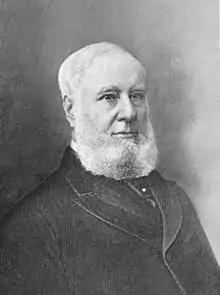Benjamin Jones | |
|---|---|
 | |
| Chair of the Republican National Committee | |
| In office June 6, 1884 – July 12, 1888 | |
| Preceded by | Dwight M. Sabin |
| Succeeded by | Matt Quay |
| Personal details | |
| Born | Benjamin Franklin Jones, Sr. August 8, 1824 Claysville, Pennsylvania, U.S. |
| Died | May 19, 1903 (aged 78) Allegheny City, Pennsylvania, U.S. |
| Political party | Republican |
| Spouse | Mary McMasters |
| Children | 1 |
| Signature | |
Benjamin Franklin Jones (August 8, 1824 – May 19, 1903) was a pioneer of the iron and steel industry in Pittsburgh, United States.[1] Originally involved in the river barge industry, he purchased a share in American Iron Works in 1851, along with Bernard Lauth.[2] He later joined with James H. Laughlin to form Jones and Laughlin Steel Company, a steel mill heavily dependent on river transportation. The B.F. Jones Memorial Library in Aliquippa Pennsylvania, the site of J&L Steel's Aliquippa Works, was built in his honor with funds donated by his daughter.
Biography
He was born on August 8, 1824, in Claysville, Pennsylvania. He married Mary McMasters and together they had a son, Benjamin Franklin Jones Jr. From 1884 to 1888 he was chairman of the Republican National Committee. He died on May 19, 1903, in Allegheny City, Pennsylvania.
Legacy
He was executor of Laughlin's estate.[3]
Politics
As chairman of the Republican National Committee from 1884 to 1888, he was responsible for the James G. Blaine presidential campaign during the 1884 United States presidential election, in which Blaine was defeated by Grover Cleveland.
See also
References
- ↑ "Family's Fourth". Time (April 13). April 13, 1936. Archived from the original on October 25, 2012. Retrieved August 9, 2008.
- ↑ Swank, James Moore, ed. (1902). "Death of Hon. B.F. Jones". Statistics of the American and foreign iron trades for 1902. Annual statistical report of the American Iron and Steel Association. American Iron and Steel Association. Philadelphia: Allen, Lane & Scott. pp. 9–10. OCLC 7450172.
- ↑ "They want the road sold" (PDF). The New York Times. Pittsburgh. February 2, 1890. p. 2. Retrieved December 6, 2021.